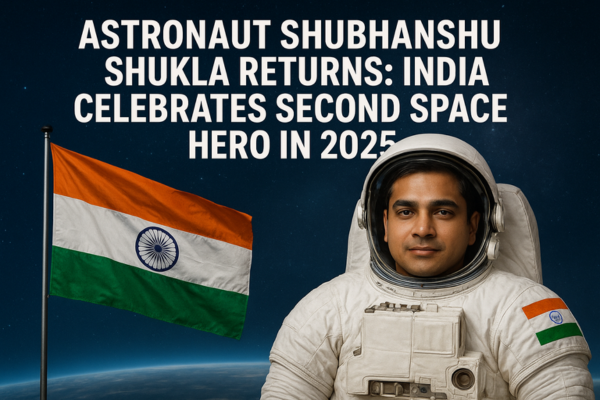Introduction:
In a moment of pride and glory for the nation, Astronaut Shubhanshu Shukla returns to India after completing his historic space mission in 2025. As India’s second astronaut to travel beyond Earth, Shukla’s return has ignited a wave of celebration, patriotism, and curiosity across the country. His journey is not just a scientific milestone but also a testament to India’s growing dominance in the field of space exploration.
This blog post explores Shubhanshu Shukla’s journey, the significance of his mission, how India prepared for this success, and what his return means for the future of Indian space programs.
Who is Astronaut Shubhanshu Shukla?
Early Life & Education

- Born on October 10, 1985, in Lucknow, Uttar Pradesh, India WikipediaEncyclopedia Britannica.
- Educated at City Montessori School in Lucknow. Inspired by the 1999 Kargil War, he pursued the NDA exam and earned a B.Sc. in Computer Science from the National Defence Academy in 2005 Wikipedia.
- Completed flying training at the Indian Air Force Academy, securing a commission in June 2006 Wikipedia.
Military & Test Pilot Career
- Rises to the rank of Group Captain in the Indian Air Force (IAF), amassing over 2,000 flight hours on diverse aircraft such as MiG-21, MiG-29, Jaguar, Su-30MKI, BAE Hawk, and more Wikipedia.
- Renowned as a test pilot, embodying technical expertise and operational excellence.
Astronaut Selection & Training
- Shortlisted in 2019 for ISRO’s human spaceflight initiative (Gaganyatri group). Underwent initial training at Russia’s Yuri Gagarin Cosmonaut Training Center (2020–21), followed by mission-specific training in Bangalore. Earned an M.Tech in Aerospace Engineering from IISc Wikipedia.
- One of four astronauts chosen for India’s first crewed mission, Gaganyaan Encyclopedia Britannica.
Axiom Mission 4 (Ax-4) to the ISS
- Selected as mission pilot for Axiom Mission 4, marking his journey to the International Space Station (ISS) aboard a SpaceX Crew Dragon in June 2025 Wikipedia+2Wikipedia+2.
- The mission launched on June 25, 2025, and docked with the ISS the following day. Shukla spent approximately 18 days (around 20 days total) aboard, conducting over 60 experiments — including at least seven designed by ISRO and academic institutions on topics like space agriculture, cognitive effects, microbial adaptation, and muscle atrophy Wikipedia+2Wikipedia+2Encyclopedia BritannicaThe Times of IndiaYouTubeIndiatimes.
- His return to Earth occurred on July 14, with safe splashdown; he then returned to India in mid-August YouTubeThe Times of India+1Indiatimes.
Significance & National Impact
- Shukla is the first Indian to visit the ISS and the second Indian in space, after Wing Commander Rakesh Sharma in 1984 WikipediaIndiatimesNews on Air.
- His mission strengthens ISRO’s human spaceflight experience and fuels progress toward an independent mission under Gaganyaan WikipediaIndiatimesThe Economic Times.
- His presence enabled a touching moment: Prime Minister Narendra Modi spoke with him aboard the ISS, saying that though “far from India,” Shukla stayed “closest to Indians’ hearts” The Economic Times.
Homecoming & Remembrance
- Lands safely in India on August 17, 2025, greeted by dignitaries, including Union Minister Jitendra Singh, Delhi CM Rekha Gupta, his wife, and others — marking a moment of national jubilation The Times of India+1Navbharat TimesThe TribuneThe Indian ExpressThe Economic Timeswww.ndtv.com.
- The Lok Sabha held a special session to honor his mission, underscoring its significance for India’s journey toward becoming a spacefaring nation by 2047 www.ndtv.com.
Before we dive into the details of the mission, it is essential to know who Shubhanshu Shukla is. Born in Uttar Pradesh, Shukla pursued aerospace engineering and later joined the Indian Space Research Organisation (ISRO). His passion for science and his resilience made him a standout candidate for India’s manned space program. Astronaut Shubhanshu Shukla Returns.
Shukla is now celebrated as a household name, much like Rakesh Sharma in 1984, who was the first Indian astronaut. But in 2025, with Astronaut Shubhanshu Shukla returns, India has proved its capability of sending humans into space with indigenous advancements.
India’s Space Dream Takes Flight
India’s space journey began humbly in the 1960s, with rockets transported on bicycles. Over decades, ISRO has stunned the world with missions like Chandrayaan, Mangalyaan, and solar studies. But sending a human into space has always been seen as a prestigious leap.
- In 1984, Rakesh Sharma became the first Indian in space.
- After decades, the Gaganyaan Mission was launched to put Indian astronauts into orbit.
- Now, in 2025, Astronaut Shubhanshu Shukla returns as India’s second space traveler, marking a new chapter.
This success cements India’s place alongside the US, Russia, and China as nations capable of human spaceflight.
Shubhanshu Shukla’s Mission: A Historic Achievement
The mission was not just about sending an astronaut into space but about testing India’s self-reliant technology. Astronaut Shubhanshu Shukla Returns
- Duration: Shukla spent several days in low Earth orbit.
- Experiments: Conducted microgravity tests, space medicine trials, and communication system experiments.
- Teamwork: The mission was supported by hundreds of ISRO scientists, engineers, and medical experts.
- Safety: The spacecraft was equipped with advanced life-support systems, ensuring Astronaut Shubhanshu Shukla Returns.
His successful journey ensures that India can dream bigger—long-term missions, lunar bases, and interplanetary exploration.
Grand Welcome in Delhi
When Astronaut Shubhanshu Shukla returned to Delhi, he was welcomed like a national hero. Prime Minister Narendra Modi, ISRO Chairman S. Somanath, and thousands of people gathered to celebrate his homecoming.
The celebration included:
- A ceremonial guard of honor at Delhi airport.
- Interaction with school children, inspiring the next generation.
- Felicitation ceremony at Vigyan Bhavan.
His words upon landing were simple yet powerful: “This mission is not mine alone; it belongs to every Indian who believes in our potential to reach the stars.” Astronaut Shubhanshu Shukla Returns.
Why Astronaut Shubhanshu Shukla’s Return Matters for India
1. Boost to National Pride
Much like the 1984 moment with Rakesh Sharma, Shukla’s mission revives national pride and inspires millions. Astronaut Shubhanshu Shukla Returns
2. Strengthening ISRO’s Global Position
With this mission, Astronaut Shubhanshu Shukla Returns India joins the elite club of nations with human spaceflight capability. International space agencies will now look to collaborate more closely with ISRO.
3. Inspiring Future Generations
For students and young scientists, Astronaut Shubhanshu Shukla returns is a symbol that dreams can be achieved with determination and innovation.
4. Gateway to Bigger Missions
Astronaut Shubhanshu Shukla Returns India is now more confident in planning missions to the Moon, Mars, and even long-term space stations.
International Reactions
The global space community has lauded India’s achievement. NASA, Roscosmos, and ESA officials congratulated ISRO and Shubanshu Shukla. Several international media outlets highlighted how India achieved this milestone at a fraction of the cost compared to other countries.
China’s space agency also acknowledged the mission, noting the potential for cooperation in future projects.
Challenges Faced During the Mission
No mission is without hurdles. ISRO had to overcome:
- Developing reliable life-support systems.
- Ensuring safe re-entry into Earth’s atmosphere.
- Extensive astronaut training in Russia and India.
- Managing costs while maintaining world-class safety standards.
The fact that Astronaut Shubhanshu Shukla returns safely is proof of ISRO’s meticulous planning and execution.
The Future of Indian Space Missions
Shubanshu Shukla’s successful mission is only the beginning. ISRO is already planning:
- Gaganyaan 2 with multiple astronauts.
- India’s first lunar manned mission by 2030.
- Collaboration with private space-tech firms in India for space tourism.
With this foundation, India is stepping into a new space age.
Conclusion
The day Astronaut Shubhanshu Shukla returns will be remembered as a golden chapter in India’s history. His courage, ISRO’s brilliance, and India’s vision for space exploration have together created a proud moment for every citizen.
Just like Rakesh Sharma inspired generations in 1984, Shubhanshu Shukla will ignite the dreams of millions of young Indians who dare to look up at the stars and say: “One day, I too can be there.”
FAQs on Astronaut Shubhanshu Shukla’s Return
Q1. Who is Shubhanshu Shukla?
Shubhanshu Shukla is India’s second astronaut, who returned from a successful space mission in 2025.
Q2. Why is Astronaut Shubhanshu Shukla returns significant?
It proves India’s ability to conduct independent human spaceflight missions, placing the nation among elite space powers.
Q3. Which mission took Shubhanshu Shukla to space?
He was part of India’s Gaganyaan Mission 2025, developed and executed by ISRO.
Q4. How long did Shukla spend in space?
He spent several days in orbit, conducting experiments on microgravity, medicine, and communications.
Q5. What does this mean for India’s future in space?
India will now aim for advanced missions, including lunar bases, Mars exploration, and possibly a permanent space station.


Such this article is very helpful for competitive examination thank you very much sir.
Such this article is very helpful for competitive examination.